Revolutionise Learning Through Self-Assessment
Experiential learning is vital in our fast-changing world. Kolb’s Reflective Cycle, created by David A. Kolb in 1984, is a powerful tool for analysing experiences, boosting performance, and refining decision-making. Overall, it has four stages—Concrete Experience, Reflective Observation, Abstract Conceptualisation, and Active Experimentation—this cycle enables dynamic growth.
The model also identifies four learning styles—Accommodator, Diverger, Converger, and Assimilator—aligned with the four-stage learning process.
By embracing your learning style and incorporating Kolb’s Reflective Cycle, you can enhance adaptability, learning, and success across various personal and professional experiences.
Kolb’s Experiential Learning Theory
Kolb’s Experiential Learning Theory, created by psychologist David Kolb, explains how people learn through a cyclical process based on their experiences. Furthermore, This theory highlights the importance of reflecting on and analysing one’s own experiences to improve understanding and facilitate learning.
What Are the Four Stages of Kolb’s Reflective Cycle?
Kolb’s Reflective Cycle comprises four distinct stages that individuals progress through during their learning process. These stages are:
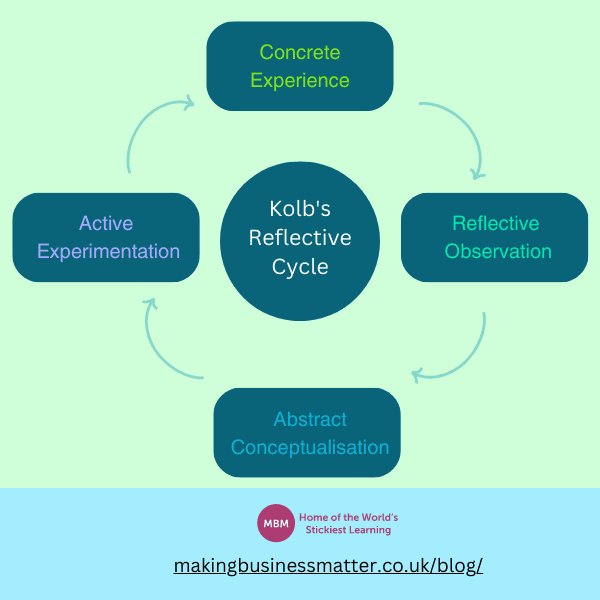
#1. Concrete Experience (CE):
In this stage, you immerse yourself in a new experience, gather information and participate actively. All in all, this forms the foundation for the learning process.
Sticky Learning ® is 7 times more effective than 1-day training courses. Plus, you will get a Chain of Evidence proving your Return on Investment. Discover soft skills training that changes behaviours long term.

#2. Reflective Observation (RO):
Following the experience, you take a step back and carefully watch your actions and reactions, as well as those of others. Basically, you consider different perspectives and explore your thoughts and feelings about the situation.
#3. Abstract Conceptualisation (AC):
Next, you synthesise your observations and begin to form connections and patterns. In essence, you develop new concepts and frameworks to better understand the experience and what you can learn from it.
#4. Active Experimentation (AE):
Finally, you apply the insights gained from the previous stages to new experiences, testing out your new understanding in different settings or situations. Furthermore, this process of experimentation provides you with new concrete experiences and thus completes the learning cycle.
Kolb’s Reflective Cycle emphasises that learning is an ongoing and iterative process, requiring continuous reflection and adaptation. Therefore, by utilising this model, you can enhance your learning experience, making conscious efforts to engage with each stage of the cycle and maximise your personal development.
How Do You Use the Kolb Reflective Cycle?
In this section, you will learn in more detail about the four stages of Kolb’s Reflective Cycle: Concrete Experience, Reflective Observation, Abstract Conceptualisation, and Active Experimentation.
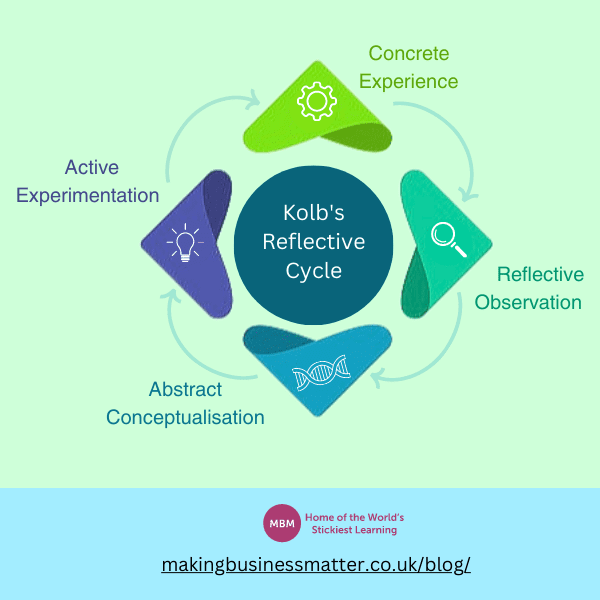
In essence, these stages help you grasp and apply new knowledge effectively as you go through the cycle.
1. Concrete Experience
During the first stage, Concrete Experience, you directly engage in a new experience or have your existing experiences re-examined. Specifically, this stage aims to build a foundation for learning by immersing you in the situation. So as you face different situations, challenge yourself to participate actively and be completely present.
2. Reflective Observation
The second stage, Reflective Observation, involves taking a step back from the experience and observing the events from different perspectives.
At this stage, you should:
- Analyse your thoughts, emotions and reactions to the experience.
- Consider alternative viewpoints and gather insights from others.
- Identify patterns, trends and causal relationships in the experience.
Also, in this stage, it’s essential to maintain an open mind, be open to change, and avoid jumping to conclusions.
3. Abstract Conceptualisation
Abstract Conceptualisation is the third stage of Kolb’s Reflective Cycle, where you integrate your observations and reflections into a new understanding or theoretical framework. Generally, to achieve this, you should:
- Draw conclusions from your observations.
- Develop new ideas, theories, and concepts.
- Determine how this new understanding applies to broader contexts.
Remember to stay objective and critical when synthesising new concepts to maintain a reliable foundation for learning.
4. Active Experimentation
In the final stage, Active Experimentation, you put your newly developed concepts and theories into practice to test their validity. Moreover, this is an opportunity for you to:
- Apply your new understanding in different situations.
- Experiment with various strategies and approaches.
- Learn from the outcomes, either positive or negative.
Through active experimentation, you complete the cycle and gain insights to progress further in subsequent cycles. All in all, this iterative process helps you to continuously learn and adapt to various contexts.
Importance of Reflection in Learning
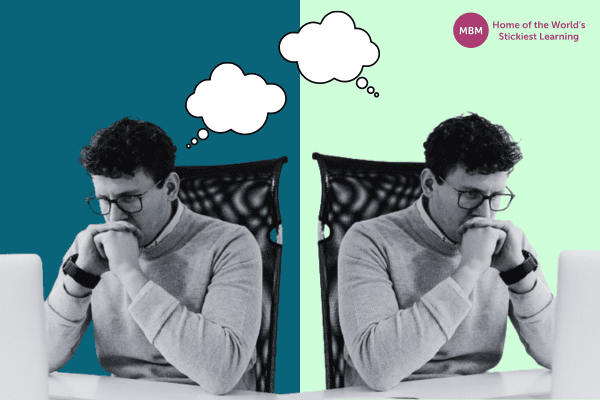
In your learning journey, embracing reflection is crucial for several reasons.
When you engage in reflection, you give yourself the opportunity to process new information and experiences, resulting in deeper understanding and stronger connections with previously acquired knowledge.
This is a key factor in Kolb’s Reflective Cycle, which emphasises the significance of reflection in the learning process. Here are some reasons why.
Firstly, reflection allows you to develop self-awareness by examining your thoughts, feelings, and reactions to certain experiences. And by analysing these personal insights, you become more attuned to your learning preferences and can identify areas for improvement.
The Reflective Observation stage in Kolb’s model is particularly beneficial in this aspect, as it encourages you to recount and evaluate your experiences to enhance your learning.
Another important aspect of reflection is the opportunity it provides for critical analysis. Basically, by scrutinising your actions or decisions, you can pinpoint areas that were successful and areas that require growth. This helps you to build on your current knowledge, creating a solid foundation for future learning.
A few practical ways to incorporate reflection into your learning process include:
- Journal writing: Note down your thoughts, experiences, and questions to revisit later and enhance learning.
- Discussion groups: Share your experiences with your peers to gain different perspectives and insights.
- Pausing for thought: After an experience or activity, take a moment to reflect on what just happened and what could have been improved.
By actively engaging in reflection, you’ll be able to establish a continuous learning loop, allowing you to maximise the benefits of your learning experiences. Also important, remember that reflection is not a one-time activity, but rather a continuous process that should be integrated into every aspect of your learning journey.
Related resource: Great Learning Guide
Kolb’s Learning Styles
Kolb’s learning styles are fundamentally rooted in the framework of the experiential learning theory, meticulously crafted by the intellect of David A. Kolb. Additionally, These distinctive styles can be effectively gauged through the utilisation of the Kolb Learning Style Inventory.
Accordingly, they are distinctly characterised by an individual’s distinctive leaning towards the four distinct phases within the learning cycle: Concrete Experience, which lays the foundation; Reflective Observation, which invites thoughtful contemplation; Abstract Conceptualisation, which encourages high-level synthesis; and Active Experimentation, which propels hands-on exploration.
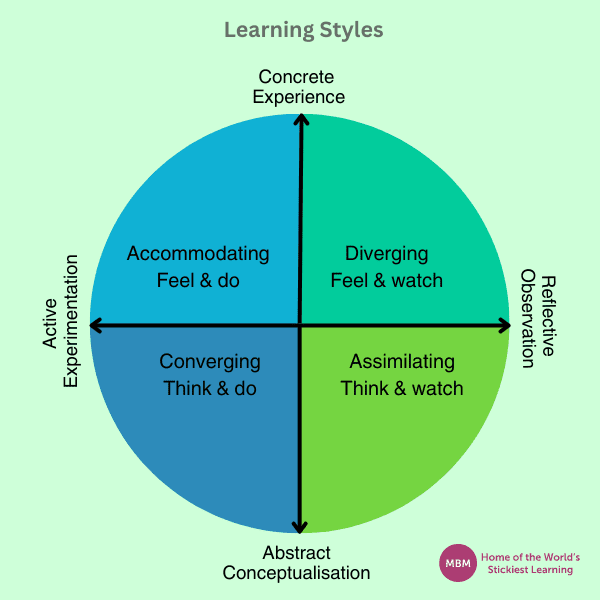
In this section, you will learn about the four different learning styles: Diverging, Assimilating, Converging, and Accommodating.
1. Diverging (feeling and watching – CE/RO)
Diverging learners excel in Concrete Experience and Reflective Observation. Basically, as a diverging learner, you have the ability to view situations from multiple perspectives. You are sensitive and prefer to observe rather than engage in hands-on activities. Also, your strong imagination allows you to creatively solve problems.
Key characteristics of diverging learners include:
- Emphasis on gathering information.
- Preference for group work and brainstorming.
- Appreciation of diverse ideas and opinions.
2. Assimilating (watching and thinking – AC/RO)
Assimilating learners are dominant in Abstract Conceptualisation and Reflective Observation. If you are an assimilating learner, you value logical thinking and use clear, concise explanations to process new information. Additionally, you tend to rely more on theories and abstract ideas than on practical applications.
Your approach to learning may involve:
- Seeking theoretical understanding.
- Reflecting on experiences to form ideas.
- Solving problems through logical analysis.
3. Converging (doing and thinking – AC/AE)
Converging learners are adept in Abstract Conceptualisation and Active Experimentation. As a converging learner, you have the ability to make effective decisions based on logical reasoning. You are skilled at finding practical solutions to problems and tend to be more focused on tasks rather than people.
Characteristics of converging learners include:
- Application of theoretical concepts in practice.
- Focus on specific goals and objectives.
- Preference for independent work.
4. Accommodating (doing and feeling – CE/AE)
Accommodating learners thrive in Concrete Experience and Active Experimentation. Basically, if you are an accommodating learner, you learn best through active involvement in experiences. Also, you are adaptive, enjoy taking risks and are comfortable with unfamiliar situations.
Your learning preferences may involve:
- Hands-on activities and experimentation.
- Learning through trial and error.
- Collaboration and working with others.
Click the image below for a larger resolution:
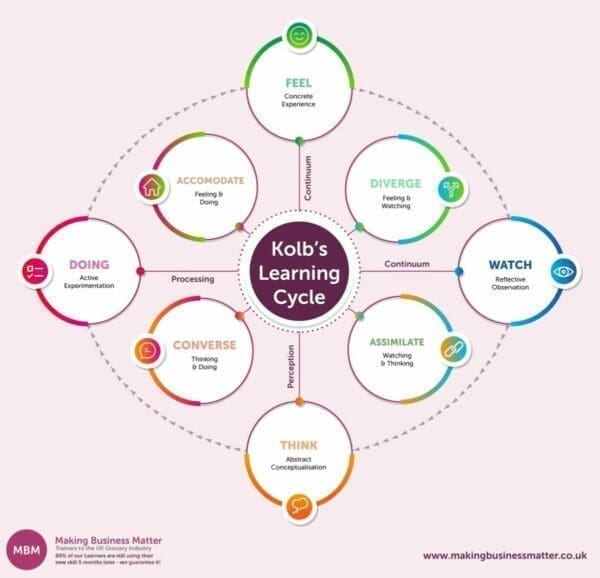
Practical Applications
In education, Kolb’s Reflective Cycle can help you develop a deeper understanding of concepts and improve your skills. To apply the cycle, follow these steps:
1. Concrete Experience:
Engage in an activity or experience, taking note of your thoughts and feelings at the time.
2. Reflective Observation:
After the activity, contemplate your actions and the outcome. Consider what went well and what might need improvement.
3. Abstract Conceptualisation:
Analyse your reflections to identify patterns and form new concepts. This phase involves theory building and emphasising key aspects of the experience.
4. Active Experimentation:
With your newly identified concepts, apply them to real-life situations, test out your ideas, and adjust your approach as needed.
The benefits of using Kolb’s Reflective Cycle include:
- Enhanced performance: Regularly reflecting on your actions promotes self-awareness and the identification of strengths and weaknesses. All in all, this can help to improve your overall performance.
- Deeper learning: Through the cycle, you can extract valuable insights from your experiences and apply them to future actions, resulting in more effective learning.
- Increased adaptability: Reflecting on various scenarios enables you to develop a broader skill set, eventually, making you more adaptable to different situations.
In the context of application, some practical examples might include:
- Academic projects: At each stage of a project, use the cycle to reflect on your progress and refine your approach, leading to a more effective outcome.
- Workplace tasks: Regularly examine your performance in different tasks, identify areas for development, and finally, test new strategies to improve efficiency.
- Personal growth: Reflect on various aspects of your life, such as relationships and hobbies, to identify patterns and implement changes for personal development.
Educational Implications and Effectiveness
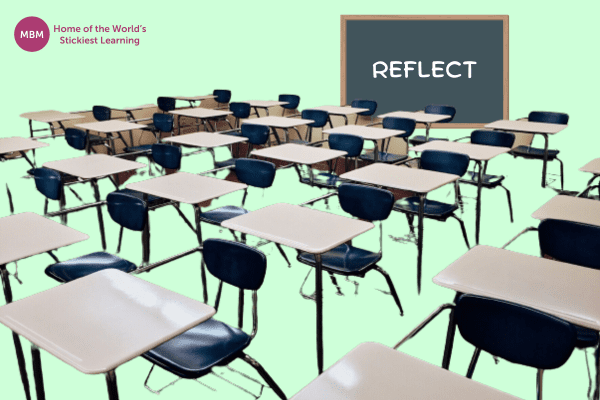
When incorporating Kolb’s Reflective Cycle into your training or professional development, there are several key aspects to consider. Moreover, these educational implications and effectiveness elements can help you to understand and make the most of this powerful learning tool.
1. Training and Reflection:
By promoting a continuous cycle of experiencing, reflecting, thinking, and acting, you will be encouraging learners to take more responsibility for their learning process. Eventually, this active engagement will help develop critical thinking, problem-solving, and self-awareness skills that are vital for success in today’s rapidly changing world.
2. Assimilators and Problem-solving:
Assimilators are learners who work best when given time to think and explore theoretical concepts before applying them in practice. Kolb’s Reflective Cycle caters to this learning style by allowing ample time for reflection and abstract conceptualisation, followed by active experimentation and practical application.
3. Competency-based Degrees and Professional Development:
Integrating Kolb’s Reflective Cycle into competency-based degrees or professional development programmes can lead to more meaningful learning experiences, as learners can recognise and articulate the skills they acquired throughout the cycle. As a result, this prepares them for future challenges and helps to build a strong foundation for lifelong learning.
4. Reflective Practice and Personal Growth:
Reflective practice is unequivocally an essential cornerstone of professional growth and self-improvement. Additionally, by incorporating Kolb’s Reflective Cycle into your ongoing professional development journey, you actively foster an environment of receptiveness to feedback, enabling you to introspectively assess your experiences and adeptly transfer your newfound knowledge to your subsequent tasks and actions. This iterative process not only nurtures a culture of continuous improvement but also nurtures the development of pivotal skills in your chosen field.

>> Grow Coaching Cards <<
>> Access on Amazon <<
In summary, incorporating Kolb’s Reflective Cycle into your educational environment, training programmes, or professional development opportunities has a wide range of benefits. This versatile and adaptable approach to learning encourages reflection, self-awareness, and the development of critical thinking skills, ultimately empowering you to excel in your chosen field.
Criticisms and Limitations of Kolb’s Reflective Cycle

While you explore Kolb’s Reflective Cycle, it is essential to be aware of its criticisms and limitations. To start off, one of the major criticisms of Kolb’s model is its oversimplified view of learning styles. Basically, the model assumes that individuals learn in certain ways, disregarding factors such as genetics, life experiences, and culture.
Secondly, Kolb’s theory has been challenged for its lack of empirical evidence supporting the learning styles hypotheses. Learning styles theories in general have faced criticisms for their overemphasis on categorising learners into specific types. It is important to consider that people may learn through a combination of styles and that these styles might evolve or change over time.
Another limitation of Kolb’s model is that it focuses primarily on the individual learner, neglecting the role of social and cultural contexts in the learning process. Different cultures might have varied approaches to learning, and considering these variations is crucial in understanding how individuals learn effectively.
Furthermore, Kolb’s model assumes that all learners are open to new experiences, but this may not always be true. People may be defensive or resistant to particular experiences due to their past experiences or other factors.
Keeping these criticisms and limitations in mind, it is vital for you to reflect on how Kolb’s Reflective Cycle applies to your own learning experiences and adapt the model as necessary to address the diverse factors that influence your learning process.
Related reading: Check out our article on Sticky Learning.
Alternative and Complementary Approaches for Kolb’s Reflective Cycle
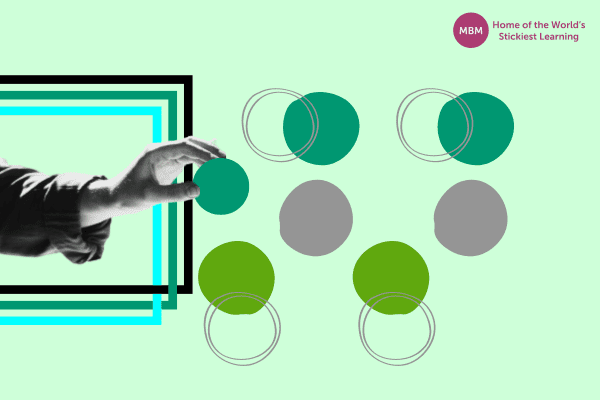
#1- Traditional Classroom Setting
In a traditional classroom setting, you might find yourself in a passive learning environment where the teacher delivers lectures, and you take notes. This approach can be useful for obtaining foundational knowledge. However, it might not provide opportunities to apply what you’ve learned to real-life situations.
#2- Direct Experience
Direct experiences, such as internships or work placements, can be incredibly valuable for your learning process. So by immersing yourself in a real-life context, you have the chance to apply your theoretical knowledge and develop practical skills. Additionally, this direct-experience approach complements Kolb’s Reflective Cycle, as it enables you to actively engage in experiential learning.
#3- MOOCs
Massive Open Online Courses (MOOCs) offer an alternative approach to learning, as they provide a more flexible, learner-centred environment. Furthermore, the wide range of topics covered in MOOCs can empower you to explore new subjects and broaden your understanding. All in all, these online courses can support your learning journey as they provide self-paced learning and connection with other learners worldwide.
#4- Lectures
Lectures can be a useful complementary method to Kolb’s Reflective Cycle as they provide expert knowledge from teachers and researchers. While lectures might not offer a direct-experience learning environment, they expose you to diverse perspectives and encourage critical thinking. Keep in mind, it’s essential to complement lecture-based learning with hands-on experiences to fully grasp the discussed concepts.
All in all, to make the most out of these alternative and complementary approaches, combine them with Kolb’s Reflective Cycle. In so doing, you’ll engage in a dynamic learning process where you can constantly reflect on your experiences, relate them to theoretical knowledge, and obtain a deeper understanding by actively experimenting with new ideas.
While you’re here, check out our shop. Learn about other reflective cycles.
Updated: August 2023 by Farah Yasser Salama




